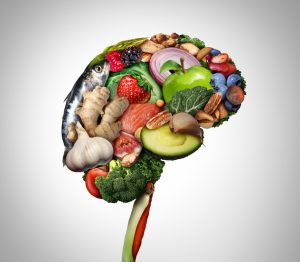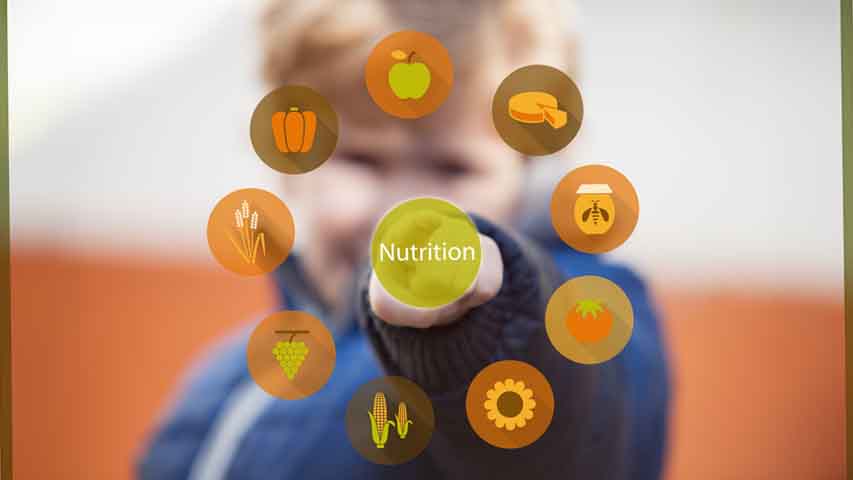Proper nutrition plays a critical role in shaping a child’s cognitive abilities, including memory, attention, problem-solving skills, and overall academic performance. From prenatal to adolescence, the brain undergoes rapid growth and development, requiring specific nutrients to support its structure and function. Here’s an overview of how good nutrition influences cognitive development in children:
Key Nutrients for Brain Development
 Omega-3 Fatty Acids
Omega-3 Fatty Acids
Omega-3 fatty acids, found in oily fish like salmon, walnuts, and flaxseeds, are crucial for brain structure and function. Specifically, DHA (docosahexaenoic acid) supports the development of neurons and synapses. Studies have shown that children with higher intakes of omega-3 fatty acids perform better on memory and learning tasks.
Iron
Iron is essential for oxygen transport in the blood and energy production in brain cells. Iron deficiency, common in young children, can lead to poor attention span, reduced IQ, and difficulty with problem-solving. Foods like lean meat, fortified cereals, and spinach are excellent sources.
Zinc
This trace mineral supports neurotransmitter function and brain signalling. Zinc deficiency has been linked to impaired cognitive abilities, including slower information processing. Food sources include meat, seeds, nuts and whole grains.
B Vitamins (especially B12 and Folate)
B vitamins support energy metabolism in the brain and help in the production of neurotransmitters. Deficiency in these vitamins, often due to poor diet, can affect memory and mood regulation. Foods like eggs, dairy, and green leafy vegetables are rich in these vitamins.
Carbohydrates
Glucose is the brain’s primary energy source. It is broken down from carbohydrates consumed and then absorbed into the blood, which is transported to our organs for energy. A balanced diet that includes complex carbohydrates, like whole-grain bread, pasta, beans, lentils, brown rice, fruit, and vegetables, ensures a steady supply of glucose, preventing energy dips that can impact focus and learning.
 Malnutrition and Cognitive Deficits
Malnutrition and Cognitive Deficits
Children who experience malnutrition, particularly during critical growth periods, are at a higher risk of cognitive delays.
Prenatal malnutrition.
Poor maternal nutrition can lead to low birth weight, smaller brain volume, and delayed neural connections in infants.
Early Childhood Malnutrition.
Lack of essential nutrients in the first five years can result in irreversible damage to brain structure and function, impacting academic achievements and social behaviours.
The Role of Breakfast in Cognitive Function

Breakfast is often called the most important meal of the day, and this is especially true for children. Research shows that children who eat a nutrient-dense breakfast perform better in school, with improvements in memory, attention span, and math skills. Skipping breakfast, however, can result in poor concentration and fatigue throughout the day. Moreover, the diet will not meet its nutrient and energy requirements to sustain well-being.
Nutrition and Mental Health
Good nutrition boosts cognitive abilities and supports emotional well-being. Deficiencies in certain nutrients, such as magnesium or omega-3, have been associated with anxiety and depression. A diet rich in fruits, vegetables, and whole grains can help stabilise mood and improve resilience to illness.
Long-Term Benefits of Proper Nutrition
Children who maintain a balanced diet are more likely to develop healthy eating habits that sustain their cognitive and physical health into adulthood. Proper nutrition can also reduce the risk of neurodegenerative diseases like Alzheimer’s later in life.
Good nutrition lays the foundation for optimal cognitive development in children. Schools, parents, and communities play vital roles in ensuring children access nutrient-rich foods. Initiatives like interactive class sessions, events for families and afterschool activities can help bridge the gaps and ensure every child has the resources to reach their full potential.
See our range of independent Registered Nutritionist-led activities that can help your school improve nutrition and cognitive ability.



